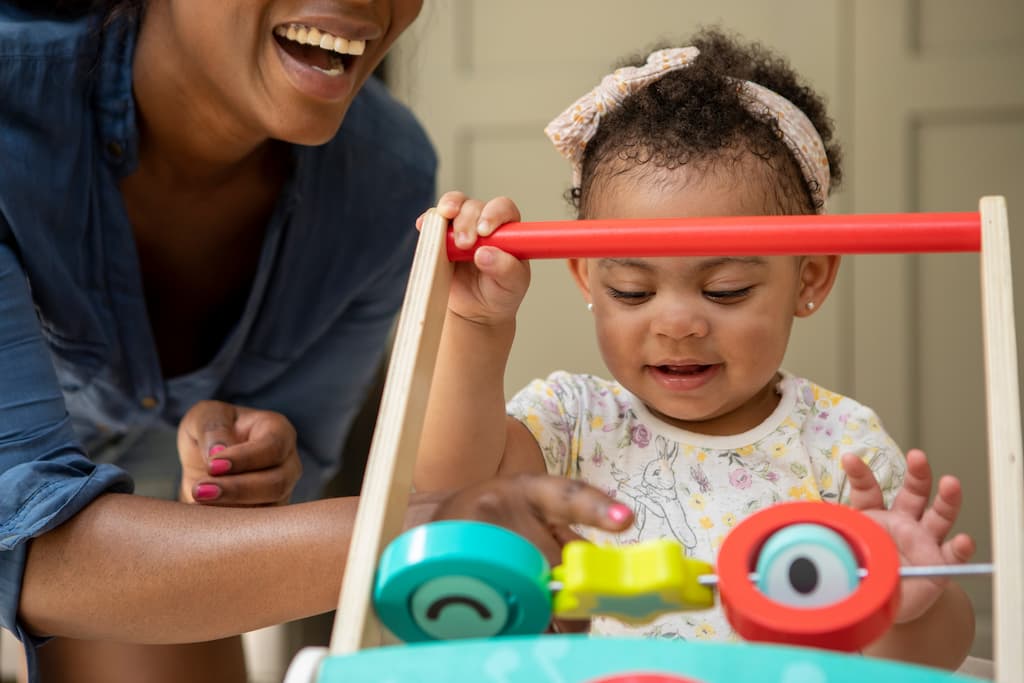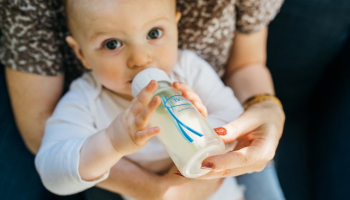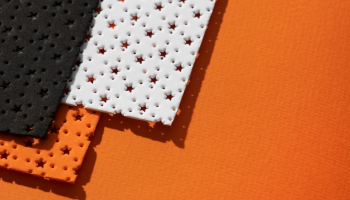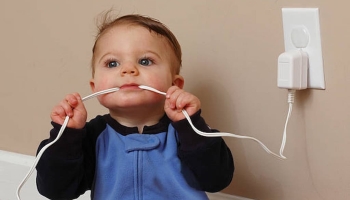
Walkers provide a safe and fun way for babies to explore their surroundings while developing their motor skills. However, for parents living in small apartments or homes, finding a walker that fits in a limited space can be a challenge. This is where narrow walkers designed specifically to maneuver through tight spaces become a game-changer.
When choosing a baby walker for small spaces, the most critical factor to consider is the size of the walker. A compact and lightweight walker that can be easily folded and stored away is ideal for smaller spaces. Additionally, the walker should be sturdy and durable to ensure the safety of your baby.
When choosing a walker for limited living spaces, we recommend CROSDE Baby Walker for its compact design, durability, and ease of storage, making it a perfect choice for small apartments and homes.
In this article, we will be reviewing the top baby walkers that meet these criteria. We will provide an in-depth analysis of each product, highlighting their features, pros, and cons. These narrow walkers are designed with tight spaces in mind, ensuring they are a perfect fit for compact living areas. With our help, you can find the perfect baby walker for your small living space, and keep your baby happy and active.
Key Takeaways
- For small spaces, a compact, lightweight, and easily storable walker ensures babies can explore safely.
- Parents should prioritize sturdy and durable walkers to ensure the safety of their babies in tight spaces.
Best Baby Walkers for Small Spaces
We understand how important it is to have a baby walker that fits in your small apartment or house, especially one that can easily navigate through tight spaces. That’s why we’ve researched and tested various baby walkers to find the best ones for smaller spaces. Our top picks are based on their size, maneuverability, safety features, and overall quality.
These narrow walkers are not only compact but are also designed to offer optimal performance in confined spaces. Whether you’re looking for a classic design or a modern one, we’ve got you covered. Here are our top recommendations for the best baby walkers that will fit perfectly in your small space.
If you’re looking for a baby walker that won’t take up too much space, the Smart Steps Activity Walker is a great option.
Pros
- The removable STEM toys are a great feature as they can be taken on the go.
- The large surround tray provides plenty of space for snacks and play.
- The extra wide base provides superior support and stability.
Cons
- Some users have reported that the seat isn’t secure and can easily fall through the walker.
- The height adjustment feature may not work for very short babies.
- The product is made in China, which may be a concern for some customers.
The Smart Steps Activity Walker is a great accessory for your child as they prepare to take their first steps. The multi-directional wheels provide freedom of movement and the extra wide base provides superior support and stability so your baby can be confident as they navigate new terrain. The large surround tray provides plenty of space for snacks and play, which is great for keeping your little one occupied.
One of the best features of this walker is the removable STEM-based toys that are attached to the tray. These toys can be easily removed and taken on-the-go, which is great for keeping your baby entertained while you’re out and about. The walker also features a 3-position height adjustment, which is great for accommodating your growing baby.
The Smart Steps Activity Walker folds flat for transport and storage, which is great for those with limited space. However, some users have reported that the seat isn’t secure and can easily fall through the walker, which is a safety concern. Additionally, the height adjustment feature may not work for very short babies.
Overall, the Smart Steps Activity Walker is a great option for those looking for a baby walker for small spaces. It’s easy to assemble, has a great tray for snacks and play, and the removable STEM toys are a great feature. However, the safety concerns with the seat and the fact that it’s made in China may be a concern for some customers.
If you’re looking for a baby walker that can be easily stored away and is perfect for small spaces, the Delta Children First Exploration 2-in-1 Activity Walker is a great option.
Pros
- The 2-in-1 design allows you to use it as an activity walker or a walk-behind walker.
- The walker is ultra-compact and can be easily folded flat for storage or transport.
- The toy tray is removable and machine washable for easy cleaning.
Cons
- The toy tray requires two AA batteries, which are not included.
- The walker is recommended for children up to 25 pounds and less than 30 inches tall.
- The seat cover is not very thick and may not be comfortable for extended periods of time.
This baby walker is perfect for parents who want a versatile and compact option for their little ones. The 2-in-1 design allows you to use it as an activity walker or a walk-behind walker, making it a great investment for your child’s development. Plus, the ultra-compact stow-away position makes it easy to store this baby walker or take it on trips.
The activity tray is a great way to entertain your baby with fun developmental toys and music, and it can be easily removed to provide a clear space to eat. The chair cover is also removable and machine washable for easy clean up.
However, the toy tray requires two AA batteries, which are not included, and the walker is recommended for children up to 25 pounds and less than 30 inches tall. Additionally, the seat cover is not very thick and may not be comfortable for extended periods of time.
Overall, if you’re looking for a baby walker that is versatile, compact, and easy to store, the Delta Children First Exploration 2-in-1 Activity Walker is a great choice.
If you’re looking for a baby walker that’s perfect for small spaces, the CROSDE Baby Walker might be the one for you.
Pros
- The adjustable height feature is perfect for babies of different ages and leg lengths, allowing them to better practice walking and avoid bow legs.
- Made of eco-friendly materials, this baby walker is both safe and strong. The cushion is breathable and wear-resistant, and the large flat tray has a recessed design to prevent items from slipping and soup from spilling.
- This foldable baby walker is easy to store and travel with. It’s only 10 inches tall when folded and can be easily placed under the bed or against the wall.
Cons
- The wheels are made of rubber material, which is quiet but may not be the best for certain surfaces.
- The walker may tip over if something gets stuck under it, so it’s important to watch your child while they’re using it.
- Some users have reported difficulty installing the extra padding that comes with the walker.
The CROSDE Baby Walker is a great option for parents who want a baby walker that’s easy to store and travel with. The adjustable height feature ensures that it can be used by babies of different ages and leg lengths, and the eco-friendly materials make it safe and strong. However, it’s important to be cautious about the wheels and to supervise your child while they’re using it.
If you’re looking for a baby walker that’s perfect for small spaces, the Creative Baby Astro Walker is an excellent choice.
Pros
- The 2-in-1 function featuring a walk behind bar allows your little one to walk and explore as they grow.
- Multiple height adjustments ensure that the walker grows with your baby.
- The music and lights keep your baby entertained while they explore.
Cons
- Some parents have reported that the walker is difficult to assemble.
- Others have noted that the wheels can be a bit stiff and don’t roll as smoothly as they would like.
- A few parents have mentioned that the toys on the walker are not very engaging for their babies.
The Creative Baby Astro Walker is a great choice for parents who are looking for a walker that will work well in small spaces. The 2-in-1 function is a great feature that allows your little one to use the walker as they grow and develop. The multiple height adjustments are also a nice touch, as they ensure that the walker will grow with your baby.
One of the best things about the Creative Baby Astro Walker is the music and lights. These features are sure to keep your baby entertained while they explore their surroundings. The ultra-comfortable seat pad and soft touch toys are also nice touches that make this walker a great choice.
While there are a few cons to consider, such as the difficulty of assembly and the stiff wheels, these issues are relatively minor and are outweighed by the many benefits of the Creative Baby Astro Walker. Overall, we highly recommend this walker to parents who are looking for a great option for small spaces.
If you’re looking for a versatile and compact baby walker, the Dream On Me 2-in-1 Ava Baby Walker might be the one for you.
Pros
- The walker is easy to convert from a seated walker to a walk-behind walker, making it perfect for babies who are learning to walk.
- The adjustable seat pad allows the walker to grow with your baby, and the high foam seat back provides added support and comfort.
- The walker features fun developmental toys for non-stop entertainment, and the machine-washable seat pad makes it easy to clean.
Cons
- The musical toy that comes with the walker is hard to keep in place and can be a bit loud.
- Some parents might find the walker a bit heavy to move around.
- The walker might not be suitable for taller babies.
The Dream On Me 2-in-1 Ava Baby Walker is a great option for parents who are looking for a compact and versatile baby walker. The walker is easy to convert from a seated walker to a walk-behind walker, and the adjustable seat pad allows it to grow with your baby. The high foam seat back provides added support and comfort, making it perfect for babies who are learning to sit upright unassisted.
The walker features fun developmental toys for non-stop entertainment, and the machine-washable seat pad makes it easy to clean. The walker is also safe for your child, conforming to all applicable ASTM standards.
However, some parents might find the walker a bit heavy to move around, and the musical toy that comes with it can be a bit loud and hard to keep in place. Additionally, the walker might not be suitable for taller babies.
Overall, the Dream On Me 2-in-1 Ava Baby Walker is a great option for parents who are on the go or tight on space, as it is able to fold compactly for easy transportation or storage.
Buying Guide
When it comes to choosing the best baby walker for small spaces, there are a few key features to consider. Here are some things to keep in mind:
Size and Space
The first and most obvious thing to consider is the size of the walker. For small spaces, you’ll want to look for a compact and lightweight design, like narrow walkers, that won’t take up too much room. These walkers are specifically designed to navigate through smaller areas easily. Some walkers, especially standard walkers, are designed to fold up for easy storage, which can be a great option if you’re short on space.
Safety Features
Safety should always be a top priority when choosing a baby walker. Look for models with features like sturdy frames, non-slip grips, and locking wheels to help prevent accidents. Evaluate the weight limit to ensure the walker can safely support your baby’s weight. Some rolling walker models also come with adjustable height settings, which can help ensure a proper fit for your child.
Comfort and Convenience
Your baby’s comfort is also an important consideration. Look for narrow walker models with padded seats and backrests, as well as adjustable straps to keep your little one secure. Evaluate the additional features that cater to your child’s comfort and enjoyment.
Entertainment Value
Consider the entertainment value the walker offers. A rolling walker equipped with engaging toys, lights, and sounds can captivate your baby’s attention and make their learning experience more enjoyable. Ensure that the entertainment features are safe and appropriate for your baby’s age and developmental stage.
Cleaning
Ease of cleaning is another crucial aspect. Babies can be messy, so look for a walker with removable and washable seat covers and a frame that can be easily wiped down. This ensures that both standard walkers and narrow walkers can be kept clean and hygienic for your baby’s use.
Price and Value
Finally, you’ll want to consider the price and overall value of the walker. While you don’t necessarily need to break the bank to get a good quality walker, it’s important to invest in a model, like a rolling walker or standard walker, that will last and provide your baby with the support they need. Look for models with good reviews and a solid reputation in the market.
By keeping these key features in mind, including the benefits of narrow walkers for confined spaces, you’ll be able to find the best baby walker for your small space that meets all of your needs and provides your little one with a safe and enjoyable experience.
Frequently Asked Questions
What are some top-rated baby walkers for small spaces?
There are several top-rated baby walkers for small spaces, including the Joovy Spoon Walker, the Delta Children Lil’ Drive Baby Activity Walker, and the Safety 1st Ready, Set, Walk! DX Developmental Walker. These walkers are designed to be compact and easy to maneuver in small spaces, while also providing your baby with a safe and fun way to explore their surroundings.
How do I choose a baby walker that is suitable for hardwood floors?
When choosing a baby walker for hardwood floors, it’s important to look for a model with rubberized wheels or grip strips on the bottom. This will help prevent the walker from slipping or sliding on the smooth surface of the hardwood floors. Additionally, you may want to consider a walker with height-adjustable settings, as this will allow you to customize the height of the walker to your baby’s needs and the height of your hardwood floors.
At what age should I consider buying a baby walker?
Most pediatricians recommend waiting until your baby is at least six months old before introducing a baby walker. This is because younger babies may not have the necessary strength and coordination to use a walker safely. Additionally, it’s important to remember that a baby walker should never be used as a substitute for adult supervision, as accidents can still occur even with the most careful use.
Are there any alternatives to baby walkers that I should consider?
Yes, there are several alternatives to baby walkers that you may want to consider, including stationary activity centers, play mats, and push toys. These alternatives provide your baby with a safe and fun way to explore their surroundings while also encouraging healthy development and growth. Ultimately, the best alternative for your baby will depend on their individual needs and preferences.
Last update on 2025-05-09 / Affiliate links / Images from Amazon Product Advertising API













